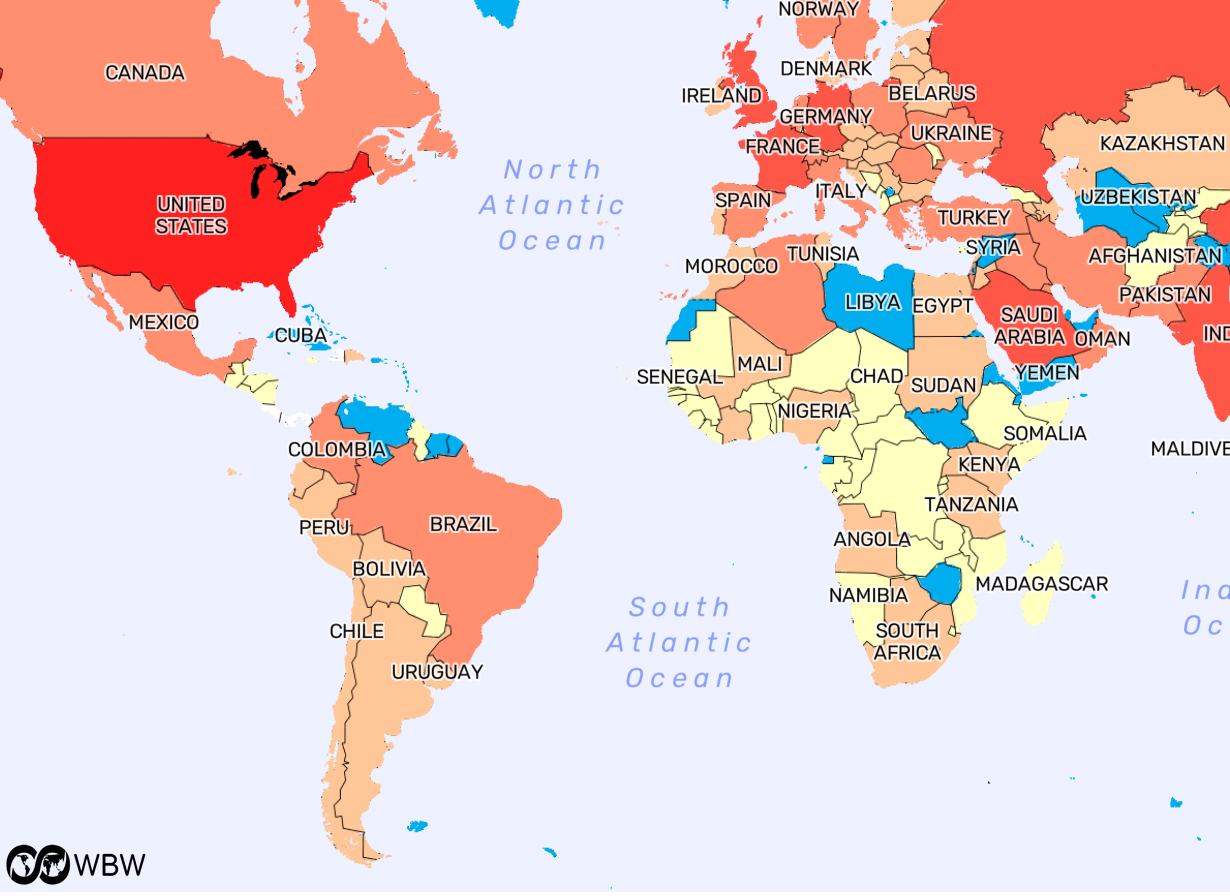
Top-war-spending countries (red): least-armed nations (blue)
Chile and Colombia to Move Money Out of Militaries
David Swanson / World BEYOND War
(May 15, 2021) — While the proposal for a global ceasefire during a disease pandemic has done the opposite of catching on, there are a few small signs of sanity and even of successful activism. While most big military spenders (including the super-mega-biggest one) have increased or kept their spending steady, the SIPRI numbers show a serious reduction from 2019 to 2020 in military spending by Brazil, and reductions as well by China, Russia, Saudi Arabia, South Korea, Turkey (the only NATO member stepping out of line on this), Singapore, Pakistan, Algeria, Indonesia, Colombia, Kuwait, and Chile.
Chile is reducing its military spending by 4.9% in order to better address the health crisis. I did say “small,” but small percentages tend to be significant amounts of money when you’re talking about military spending.
I was put onto this topic by Angelo Cardona, a member of World BEYOND War’s Advisory Board, who told me about Chile and about what he has been doing to reduce military spending in NATO partner Colombia. In 2020, Cardona said, he led the Global Campaign on Military Spending (GCOMS) in Colombia. As part of that effort, he proposed along with 28 Colombian Congress Members to transfer 1 billion Colombian pesos from militarism to the health sector. The Colombian Ministry of “Defense” agreed to do 10% of that, moving 100 million pesos (or $25 million). This action, Cardona reports, inspired Chilean Members of Parliament to do the same.
On April 26, 2021, Cardona again proposed moving 1 billion pesos from military to health in Colombia, and specifically proposed that Colombia refrain from purchasing 24 warplanes from Lockheed Martin at a cost of 14 billion Colombian pesos ($4.5 billion).
“This time,” he reports, “my request was supported by 33 Congressmen of Colombia.” Here is the letter they sent to the President of Colombia (PDF). There was a great deal of media coverage (in Spanish): one, two, three, four.
On May 4, 2021, amid protests in Colombia, Cardona was contacted by the President’s office and told that they would comply with his request not to purchase the 24 warplanes. This excellent news should encourage everyone trying to prevent Canada from buying 88 of the monstrosities. The new Minister of Finance, José Manuel Restrepo, made the announcement publicly.
Not only is this news that should be celebrated and used as a model for elsewhere, but people are already seeking to honor those involved. Parliamentarians in Chile and Colombia have nominated Angelo Cardona for a Nobel Peace Prize.
Activism continues in Colombia and Chile. Militarized police in Colombia have been attacking protesters of a plan to shift the tax burden onto working people. The military and police, until they are abolished, will remain an obvious place to find necessary resources.
David Swanson is an author, activist, journalist, and radio host. He is executive director of WorldBeyondWar.org and campaign coordinator for RootsAction.org. Swanson’s books include War Is A Lie. He blogs at DavidSwanson.org and WarIsACrime.org. He hosts Talk World Radio. He is a Nobel Peace Prize nominee, and was awarded the 2018 Peace Prize by the US Peace Memorial Foundation. Longer bio and photos and videos here. Follow him on Twitter: @davidcnswanson and FaceBook, and sign up for: Activist alerts. Articles. David Swanson news. World Beyond War news. Charlottesville news.
Posted in accordance with Title 17, Section 107, US Code, for noncommercial, educational purposes.
How Colombia’s Generals Got Rich Off the Country’s Defense Budget

Jarrod Demir / Colombia Reports
(April 17, 2018) — Top members of Colombia’s security forces have embezzled more than $7 million from funds meant to keep the country safe, according to weekly Semana.
An ongoing investigation from the magazine found that between 2013 and 2017, a branch from Colombia’s General Command was siphoning military funds into defense programs that were created for corrupt purposes.
The latest revelation of embezzlement followed a $2 million embezzlement scheme Semana revealed in December.
In the latest military embezzlement scheme, cyber security companies were used as a front to usher money into a central fund that high-ranking military officials could use for personal means.
The money was embezzled into property, travel and even to hire lawyers to defend military personnel embroiled in the mass killing thousands of civilians.
One of the ways these companies misappropriated the money was by billing large sums of money for objects that were a fraction of the cost.
Another way was to use fake informants. High-ranking generals such as Martin Nieto and Juan Pablo Rodriguez who, according to Semana, were specifically named by military officers, would forge or sometimes even create an informant and falsely pay them off.
The Inspector General’s Office said that 12 members of the military, including seven commanders, were involved in the embezzlement.
According to Caracol Radio, the Inspector General ordered the 30-day suspension of all money transfers to the so-called Joint Regional Strategic Military Intelligence unit accused of being corrupt.
The number of recruited informants was such a success that it provoked suspicion. One general allegedly recruited up to 50 informants, with only two being proved to be real.
“Many (informants) were friends of the same people in the companies and they were given five percent of the money they signed. Thanks to this, these units were internally known as ‘clown companies’, because it was a joke what was taking place”, one of the officers told Semana.
Whistleblower soldiers who came forward were dismissed from the armed forces and their accounts of possible corruption were disregarded by Colombia’s Ministry of Defense and the Prosecutor’s Office, according to Semana.
The investigation has been ongoing since the story first broke in December last year. The prosecutor general’s office has yet to file criminal charges.
Posted in accordance with Title 17, Section 107, US Code, for noncommercial, educational purposes.